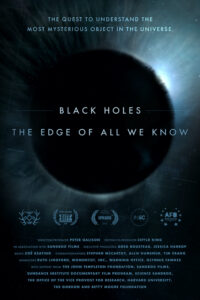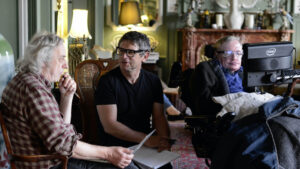Film Review: In “Black Holes: The Edge of All We Know,” Mysteries Gain Answers
Written by: Christopher Llewellyn Reed | March 1st, 2021

Black Holes: The Edge of All We Know (Peter Galison, 2020) 3 out of 4 stars.
A long time ago in a galaxy far, far away, something massive collapsed in on itself, dragging other particles with it, creating a large entity which we call a “black hole.” These rather frightening zones where matter goes to die (as far as we know, or not, as we know very little) have been the source of much ongoing speculation within the scientific community since they were first detected. And though the new documentary Black Holes: The Edge of All We Know, from director Peter Galison (Containment), may not walk us through all the ins and outs of what we do, in fact, know (including the history of that knowledge), it does a very fine job showcasing the lead-up to the first photograph ever taken of a black hole and the remarkable international cooperation that its capture represented.
Beyond that achievement, followed closely by Galison as he profiles the members of the Event Horizon Telescope (EHT) team, led by Harvard University’s Shep Doeleman, we also learn about the ongoing calculations of four astrophysicists, among them the now-late Stephen Hawking. They labor feverishly, on camera and off, to discover the perfect formula that can tell us about the “soft hair” just outside black holes that contain invaluable information about the disappeared matter within. At least I think that’s what they’re doing, since much of the science goes above my head, scribbled equations on blackboards notwithstanding. Anyone wishing to learn more can read the finished paper, published by the surviving members of the team (with credit to Hawking) – Sasha Haco, Malcolm Perry and Andrew Strominger – entitled “Black Hole Entropy and Soft Hair.” Hopefully it makes sense to others. I hope so, as they are a most genial set of protagonists.

As are the rest, though there are an exhausting number of interview subjects, with not enough repeated lower-thirds titles to remind us who they are (though some, like Doeleman and the Hawking team, are clear). The movie does a wonderful job showcasing scientists at work, however, and a diverse bunch of scientists at that. The joy of collaboration is a pleasure to behold. These are the best and the brightest at what they do, and the world benefits from their output.
The telescope narrative is particularly fascinating. In order to photograph a black hole, in this case the one in galaxy M87, which is 55 million light-years away, one needs an “Earth-sized telescope.” Alas, there is no such thing. And so the good folks involved with the EHT came up with a plan to link eight radio-dish observatories around the globe, thereby simulating that which does not exist. At a precise, synchronized moment in 2017, each observatory simultaneously captured its own image of the black hole, Then, separate teams analyzed the data and compiled one composite image (again, my understanding may be a bit fuzzy, but so is the image, so there), releasing it on April 10, 2019. It’s a milestone of technological advancement.

Whatever my limits of comprehension, I appreciate the film’s prioritizing of the human element as much as the cosmic one. We spend a lot of time in the company of compelling individuals, passionate about their profession. The mysteries of space may still be vast, but they are a little clearer today thanks to the main characters of Black Holes: The Edge of All We Know.


It has not been pointed out the lack of representation of Black people in this film. That lack of representation is a much bigger problem than the series itself. It shows how much of a barrier Black people face to get to such research and learning, and therefore keeps pushing the notion that they are not as valuable or smart enough to be sought to get to such higher levels of learning and contributions. It is such a global project and very shameful to see the lack of that diversity in it.